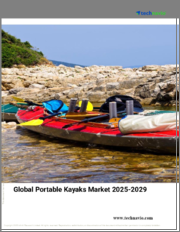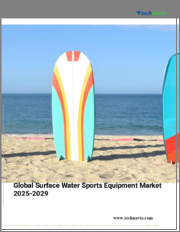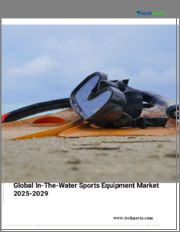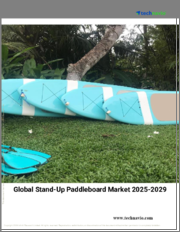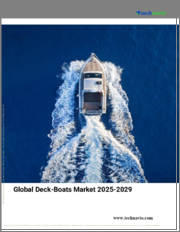
|
시장보고서
상품코드
1622741
스탠드업 패들(SUP) 보드 시장 규모 : 지역별, 범위 및 예측Global Stand-Up Paddle Boards Market Size by Type, By Size, By Application, By Sales Channel, By Geographic Scope and Forecast |
||||||
스탠드업 패들(SUP) 보드 시장 규모와 예측
스탠드업 패들(SUP) 보드 시장 규모는 2024년에 14억 5,000만 달러로 평가되며, 2024-2031년 CAGR 9.7%로 성장하며, 2031년에는 24억 달러에 달할 것으로 예측됩니다. 스탠드업 패들보드(SUP)는 서 있는 상태에서 노를 젓는 수상 자전거다. 부력이 있는 긴 보드와 패들로 구성된 SUP는 평지에서의 패들링, 서핑, 서핑, 레이싱, 요가까지 할 수 있는 다용도한 제품으로, 레크리에이션과 경쟁적인 수상 스포츠 모두에 인기가 있습니다.
SUP 보드는 일반적으로 피트니스, 레크리에이션 및 탐험에 사용됩니다. 안정적이고 사용하기 쉬워 초보자와 숙련자에게 모두 적합합니다. 해안 크루즈, 호수에서 패들링, SUP 요가, 파도타기 등의 활동이 있습니다. 또한 생태 관광 및 환경 정화 프로젝트에도 널리 사용되고 있습니다.
특수한 디자인, 지속가능한 소재, GPS 및 피트니스 트래킹과 같은 통합 기술 등 SUP 보드의 미래 용도가 확대되고 있습니다. 친환경 보드, 다양한 상황에 대응하는 하이브리드 SUP, 테라피, 수상 구조, 어드벤처 관광 분야에서의 보다 광범위한 채택 등의 성장이 예측됩니다.
스탠드업 패들(SUP) 보드 세계 시장 역학
세계 스탠드업 패들(SUP) 보드 시장을 형성하는 주요 시장 역학은 다음과 같습니다.
주요 시장 성장 촉진요인
수상 스포츠에 대한 관심 증가 :
수상 스포츠에 대한 관심 증가: 수상 액티비티의 인기가 높아지면서 SUP 보드 사업이 크게 성장하고 있습니다. 패들보드와 같은 활동은 몸을 움직이면서 자연과 교감할 수 있는 독특하고 흥미로운 방법을 제공합니다.
피트니스 및 웰니스의 중시 :
SUP 보드는 균형, 근력, 체력을 필요로 하는 전신 운동으로 간주됩니다. 사람들이 피트니스와 웰빙에 대한 관심이 높아지면서 SUP 보드에 대한 수요가 증가하고 있습니다.
가처분소득 증가
가처분소득 증가로 인해 SUP 보드와 같은 레크리에이션을 즐기는 사람들이 늘어났습니다. 그 결과 보드, 패들 및 액세서리에 대한 지출이 증가했습니다.
관광 및 레저 활동의 개발 :
해안 지역과 수상 관광지가 확대되면서 SUP 보드 대여 및 판매 기회가 생겨나고 있습니다. 이러한 지역으로 여행자가 증가함에 따라 SUP 체험에 대한 수요가 증가하고 있습니다.
주요 과제
계절성 및 지역적 제한 :
SUP의 인기는 날씨의 영향을 많이 받아 따뜻한 계절에 수요가 급증합니다. 또한 이 스포츠는 주로 해안이나 내륙의 물가에서 이루어지기 때문에 지역에 따라 이용 가능한 장소가 제한되어 있습니다.
높은 초기 투자 및 학습 곡선 :
소비자는 SUP 보드와 필수품을 구매할 때 상당한 초기 투자를 합니다. 또한 이 활동을 마스터하기 위해서는 연습이 필요하며, 초보자에게는 어렵고 잠재적인 참가자의 동기를 떨어 뜨립니다.
안전 문제 및 환경에 미치는 영향:
수질, 장비 고장, 사용자의 기술 수준과 같은 안전 문제는 모두 시장 성장에 영향을 미칠 수 있습니다. 또한 수질 오염, 서식지 파괴 등 SUP가 환경에 미치는 영향에 대한 소비자의 관심도 높아지고 있습니다.
SUP는 다른 수상 스포츠와 경쟁합니다 :
SUP는 서핑, 카약, 웨이크보드 등 다양한 경험을 제공하고 다양한 기술 수준에 맞는 다른 수상 스포츠와의 경쟁에 직면해 있습니다. 이러한 경쟁은 시장을 세분화하고 SUP의 성장성을 제한할 수 있습니다.
주요 동향 :
피트니스 활동으로서의 인기 상승 :
SUP는 전신 운동으로 인기를 끌며 피트니스 애호가들의 마음을 사로잡고 있습니다. 이러한 추세는 안정성을 높이기 위해 더 넓은 플랫폼을 가진 SUP 보드 등 운동에 특화된 SUP 보드에 대한 수요를 창출하고 있습니다.
인플레이터블 SUP 보드의 부상 :
인플레이터블 SUP 보드는 휴대성과 편리함으로 인해 점점 더 많은 인기를 얻고 있습니다. 이 보드는 쉽게 공기를 빼고 보관하고 휴대할 수 있으므로 더 많은 고객에게 어필하고 있습니다.
다양화되는 SUP 활동:
SUP은 레크리에이션용 패들링에 그치지 않고 SUP 요가, SUP 낚시, SUP 서핑 등 다양한 활동으로 확대되고 있습니다. 이러한 다양성은 특수한 보드 디자인과 액세서리의 가능성을 넓혀줍니다.
목차
제1장 서론
- 시장 정의
- 시장 세분화
- 조사 방법
제2장 개요
- 주요 조사 결과
- 시장 개요
- 시장 하이라이트
제3장 시장 개요
- 시장 규모와 성장 가능성
- 시장 동향
- 시장 성장 촉진요인
- 시장 성장 억제요인
- 시장 기회
- Porter's Five Forces 분석
제4장 스탠드업 패들(SUP) 보드 시장 : 유형별
- 인플랫터블(SUP) 보드
- 리지드(SUP) 보드
제5장 스탠드업 패들(SUP) 보드 시장 : 용도별
- 레크리에이션/올 어라운드(SUP) 보드
- 투어링/레이스용(SUP) 보드
- 서핑(SUP) 보드
제6장 스탠드업 패들(SUP) 보드 시장 : 재료별
- 에폭시(SUP) 보드
- 폴리에틸렌(SUP) 보드
- PVC(인플랫터블)(SUP) 보드
제7장 지역 분석
- 북미
- 미국
- 캐나다
- 멕시코
- 유럽
- 영국
- 독일
- 프랑스
- 이탈리아
- 아시아태평양
- 중국
- 일본
- 인도
- 호주
- 라틴아메리카
- 브라질
- 아르헨티나
- 칠레
- 중동 및 아프리카
- 남아프리카공화국
- 사우디아라비아
- 아랍에미리트
제8장 시장 역학
- 시장 성장 촉진요인
- 시장 성장 억제요인
- 시장 기회
- 시장에 대한 COVID-19의 영향
제9장 경쟁 구도
- 주요 기업
- 시장 점유율 분석
제10장 기업 개요
- BIC Sport
- Naish
- Red Paddle Co
- Starboard
- Tower Paddle Boards
- Airhead(SUP)
- Aqua Marina
- Imagine Paddle
- RAVE Sports
- Solstice Sports
- Surftech
제11장 시장 전망과 기회
- 신규 기술
- 향후 시장 동향
- 투자 기회
제12장 부록
- 약어 리스트
- 전시와 참고 문헌
Stand-Up Paddle (SUP) Boards Market Size and Forecast
Stand-Up Paddle (SUP) Boards Market size was valued at USD 1.45 Billion in 2024 and is projected to reach 2.40 USD Billion by 2031 growing at a CAGR of 9.7% from 2024 to 2031. Stand-Up Paddleboards (SUPs) are watercraft that can be paddled while standing. They consist of a long buoyant board and a paddle. SUPs are versatile, capable of flat-water paddling, surfing, racing and even yoga, making them popular for both recreational and competitive water sports.
SUP boards are typically utilized for fitness, recreational activities and exploration. Their stability and ease of use make them appropriate for both novice and experienced paddlers. Activities include coastal cruise, interior lake paddling, SUP yoga and wave surfing. They are also widely used for eco-tourism and environmental clean-up projects.
SUP boards' future applications are expanding to include specialized designs, sustainable materials and integrated technology such as GPS and fitness tracking. Growth is projected in eco-friendly boards, hybrid SUPs for various circumstances and more widespread adoption in therapy, water rescue and adventure tourism sectors.
Global Stand-Up Paddle (SUP) Boards Market Dynamics
The key market dynamics that are shaping the global stand-up paddle (SUP) Boards market include:
Key Market Drivers:
Increasing Interest in Water Sports:
The rise in popularity of water activities considerably boosted the SUP board business. Activities like as paddleboarding provide a unique and exciting way to interact with nature while also engaging in physical activity.
Focus On Fitness and Wellness:
SUP boarding is regarded as a full-body workout, requiring balance, core strength and stamina. As people value fitness and wellness, the demand for SUP boards is growing.
Increasing Disposable Income: increasing
disposable money allowed more people to indulge in recreational pursuits such as SUP boarding. This resulted in increasing spending on boards, paddles and accessories.
Development Of Tourism and Leisure Activities:
The expansion of coastal and water-based tourism areas is creating opportunities for SUP board rentals and sales. As more people travel to these areas, the demand for SUP experiences grows.
Key Challenges:
Seasonality and Geographic Limitations:
The popularity of SUP is highly impacted by weather conditions, with demand spiking during the warmer months. Furthermore, the sport is primarily played on coastal or inland water bodies, which limits its availability in some areas.
High Initial Investment and Learning Curve:
Consumers make a considerable initial expenditure when purchasing a SUP board and essential supplies. Furthermore, mastering the activity takes practice and can be difficult for beginners, discouraging potential participants.
Safety Issues and Environmental Impacts:
Safety issues like water quality, equipment failure and user skill levels can all have an impact on market growth. Furthermore, consumers are becoming increasingly concerned about SUP's environmental impact, which includes water pollution and habitat destruction.
SUP Competes with Alternative Water Sports:
SUP faces competition from other water sports such as surfing, kayaking and wakeboarding, which offer diverse experiences and cater to different skill levels. This competition can fragment the market and limit the growth potential of SUP.
Key Trends:
Increasing Popularity as A Fitness Activity:
SUP is gaining popularity as a full-body workout, attracting fitness aficionados. This trend is generating demand for exercise-specific SUP boards, such as those with broader platforms for stability.
The Rise of Inflatable SUP Boards:
Inflatable SUP boards are becoming increasingly popular due to their portability and ease. These boards are readily deflated, stored and transported, making them appealing to a larger range of customers.
Diversifying SUP Activities:
SUP is going beyond recreational paddling to include activities such as SUP yoga, SUP fishing and SUP surfing. This variety opens up potential for specialized board designs and accessories.
What's inside a VMR industry report?
Our reports include actionable data and forward-looking analysis that help you craft pitches, create business plans, build presentations and write proposals.
Global Stand-Up Paddle (SUP) Boards Market Regional Analysis
Here is a more detailed regional analysis of the global stand-up paddle (SUP) boards market:
North America:
According to Verified Market Research, North America is expected to dominate the global stand-up paddle (SUP) Boards market.
North America is predicted to lead the worldwide Stand-Up Paddle (SUP) board market due to its well-established water sports culture, extensive coastlines and robust infrastructure for recreational activities.
The region benefits from great consumer spending power, cutting-edge outdoor sports facilities and a strong market presence of top SUP brands. Paddleboarding's popularity as a fitness activity, as well as its integration into lifestyle trends, are driving growth.
Furthermore, North America's ideal temperature and abundance of water bodies increase the attraction of SUP boards, making it a top market for both leisure and professional paddlers.
Asia Pacific:
According to Verified Market Research, Asia Pacific is fastest growing region in global stand-up paddle (SUP) boards market.
Asia-Pacific is the fastest-growing area in the global stand-up paddle (SUP) boards market, owing to increasing interest in water sports and outdoor activities. The region benefits from rising disposable incomes, increasing urbanization and better recreational facilities.
Countries such as Australia, China and India are seeing considerable market increase as a result of their extensive coasts and improved access to water sports facilities.
Furthermore, the popularity of SUP boards for fitness, adventure tourism and environmental activities is driving the market's quick expansion. The growing popularity of water sports and eco-tourism contribute to the region's growth.
Global Stand-Up Paddle (SUP) Boards Market: Segmentation Analysis
The Global Stand-Up Paddle (SUP) boards Market is segmented based on Type, Application, Size, Sales Channel and Geography.
Stand-Up Paddle (SUP) Boards Market, By Type
- Solid SUP Board
- Inflatable SUP Boards
Based on Type, the Global Stand-Up Paddle (SUP) Boards Market is separated into Solid SUP Board and Inflatable SUP Boards. Inflatable SUP boards have dominated the global market due to their convenience, portability and ease of storage. They appeal to a wider audience because they can be deflated and stored, making them suitable for outdoor activities and travel. Solid SUP boards are popular due to their durability and performance, but they hold a lesser market share.
Stand-Up Paddle (SUP) Boards Market, By Application
- Surfing
- Recreational/Touring
- Racing
- Fitness
Based on Application, Global Stand-Up Paddle (SUP) Boards Market is divided into Surfing, Recreational/Touring, and Racing, and Fitness. In the global market for stand-up paddle (SUP) boards, recreational/touring applications dominate. This portion is popular among both casual paddlers and enthusiasts who enjoy exploring rivers. Recreational SUP boards are the most popular choice for a wide range of water sports since they are versatile and easy to use.
Stand-Up Paddle (SUP) Boards Market, By Size
- Less than 9 Feet
9to 12 Feet
- Greater than 12 Feet
Based on Size, Global Stand-Up Paddle (SUP) Boards Market is divided into Less than 9 Feet, 9to 12 Feet, and Greater than 12 Feet. The 9-to-12-foot size category dominates the global Stand-Up Paddle (SUP) board market due to its versatility and adaptability for a variety of activities such as leisure paddling and racing. This size strikes a compromise between stability and performance, appealing to both novice and experienced paddlers.
Stand-Up Paddle (SUP) Boards Market, By Sales Channel
- Online
- Offline
Based on Sales Channel, Global Stand-Up Paddle (SUP) Boards Market is divided into Online and Offline. The online sales channel dominates the global stand-up paddle (SUP) board market due to its convenience, broad reach and expanding e-commerce trend. Online platforms provide a diverse selection, competitive pricing and quick comparison, resulting in tremendous growth when compared to traditional offline retail channels.
Stand-Up Paddle (SUP) Boards Market, By Geography
- North America
- Europe
- Asia Pacific
- Rest of the World
Based on the Geography, the Global Stand-Up Paddle (SUP) Boards Market divided into North America, Europe, Asia Pacific and Rest of the World. North America dominates the stand-up paddle (SUP) board market due to its strong outdoor sports culture and vast water bodies. The Asia-Pacific area is expanding at the quickest rate, thanks to increasing interest in water sports, rising disposable incomes and expanded recreational facilities.
Key Players
- The Global Stand-Up Paddle (SUP) Boards Market study report will provide valuable insight with an emphasis on the global market. The major players in the market are
- BIC
- Sport, Naish, Red Paddle Co, Starboard, Tower Paddle Boards, Airhead (SUP), Aqua Marina, Imagine Paddle, RAVE Sports, Solstice Sports, Surftech.
Our market analysis also entails a section solely dedicated to such major players wherein our analysts provide an insight into the financial statements of all the major players, along with product benchmarking and SWOT analysis. The competitive landscape section also includes key development strategies, market share and market ranking analysis of the above-mentioned players globally.
- Stand-Up Paddle (SUP) Boards Market Recent Developments
- In July 2024, the introduction of IQFoils in windsurfing and kite foiling, replacing kitesurfing, will highlight the growing trend of foiling in water sports disciplines.
TABLE OF CONTENTS
1. Introduction
- Market Definition
- Market Segmentation
- Research Methodology
2. Executive Summary
- Key Findings
- Market Overview
- Market Highlights
3. Market Overview
- Market Size and Growth Potential
- Market Trends
- Market Drivers
- Market Restraints
- Market Opportunities
- Porter's Five Forces Analysis
4. Stand Up Paddle ((SUP)) Boards Market, By Type
- Inflatable ((SUP)) Boards
- Rigid ((SUP)) Boards
5. Stand Up Paddle ((SUP)) Boards Market, By Application
- Recreational/All-around ((SUP)) Boards
- Touring/Racing ((SUP)) Boards
- Surfing ((SUP)) Boards
6. Stand Up Paddle ((SUP)) Boards Market, By Material
- Epoxy ((SUP)) Boards
- Polyethylene ((SUP)) Boards
- PVC (Inflatable) ((SUP)) Boards
7. Regional Analysis
- North America
- United States
- Canada
- Mexico
- Europe
- United Kingdom
- Germany
- France
- Italy
- Asia-Pacific
- China
- Japan
- India
- Australia
- Latin America
- Brazil
- Argentina
- Chile
- Middle East and Africa
- South Africa
- Saudi Arabia
- UAE
8. Market Dynamics
- Market Drivers
- Market Restraints
- Market Opportunities
- Impact of COVID-19 on the Market
9. Competitive Landscape
- Key Players
- Market Share Analysis
10. Company Profiles
- BIC Sport
- Naish
- Red Paddle Co
- Starboard
- Tower Paddle Boards
- Airhead ((SUP))
- Aqua Marina
- Imagine Paddle
- RAVE Sports
- Solstice Sports
- Surftech
11. Market Outlook and Opportunities
- Emerging Technologies
- Future Market Trends
- Investment Opportunities
12. Appendix
- List of Abbreviations
- Sources and References









